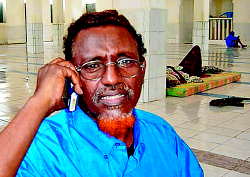
Sheikh Hassan Dahir Aweys, leader of the Consultative Council of the Supreme Islamic Council of Somalia, a photo by Pan-African News Wire Photo File on Flickr.
Sabahi (Washington, DC)
Somalia: What the Jailing - - or Freeing - - of Aweys Means for Somalia
BY ABDI MOALIM, 18 SEPTEMBER 2013
Mogadishu — Former al-Shabaab leader Hassan Dahir Aweys has been in Somali government custody for more than two months, but President Hassan Sheikh Mohamud's administration has yet to make clear whether it plans to prosecute the militant or let him go.
The 77-year-old surrendered to Himan and Heeb authorities on June 25th after fleeing factional fighting in Barawe between forces loyal to top al-Shabaab commander Ahmed Abdi Godane and second-in-command Ibrahim al-Afghani, who is now deceased.
Himan and Heeb authorities then handed Aweys to Somali government authorities who promptly arrested him, sparking protests among his loyalists demanding his release.
When the federal government last issued a statement on Aweys in July, Mohamud said his administration would announce its decision later, without going into detail. The prolonged wait has led people to question how the Somali government intends to hold accountable those who are accused of committing crimes against civilians.
Soft on terrorism?
Ahlu Sunna wal Jamaa (ASWJ), the pro-government militia that has fought against Hizbul Islam and al-Shabaab, is demanding that the government prosecute Aweys for the crimes he committed, said Sheikh Omar Abdulkadir, chairman of ASWJ's ruling council.
"He has to be brought to justice to convince the Somali public that no one is above the law and then punish him for whatever he is convicted of," he told Sabahi.
Releasing Aweys would undermine reconciliation efforts, Abdulkadir said, describing those who were pressing the government to free Aweys as collaborators.
"If Aweys is released, it could lead to frustration and demoralisation among the numerous people who were harmed during conflicts with the group he led," said former Somali National Intelligence and Security Agency (NISA) chief Ahmed Moalim Fiqi.
The government's delay in publicising its decision harms national reconciliation efforts because Somalis fear that Aweys could be released without being taken to court due to pressure from tribal elders who are supporting him, he said.
Fiqi also said the release of Aweys would send a signal to his loyalists that the government is soft on terrorism, encouraging them to continue their activities and thus undermining the government's authority.
Government controlled regions attempting to resurrect law and order will be vulnerable to Aweys' fighters, he said.
Freeing Aweys without clear and satisfactory reasons would cause irreparable damage and jeopardise the aid the Somali government receives from the international community, Fiqi said.
"The donor governments will be unable to trust the Somali government, especially on how it will deal with the leaders and members of al-Shabaab after they are captured by the government," he said. "[This would also] create doubts about the government's plans on fighting terrorism, which will halt the aid connected to those issues."
A long history of extremism:
In the early 1990s, Aweys joined and became the leader of al-Itihaad al-Islamiya (AIAI), a group partly funded by Osama bin Laden and linked to several terrorist attacks in the Horn of Africa.
Under his leadership, AIAI engaged in several battles to gain control over Somali territories, including the battle of Saliid in Sanaag, one of the deadliest battles in the region's history, according to traditional elders who spoke to Sabahi.
People like Aweys who are responsible for killing Somali civilians should be held accountable, said Said Dahir, a traditional elder in Mogadishu.
"We request that he be charged with the crimes he committed against the nation. We are against releasing him without facing any charges," Dahir said.
Dahir Irro, who served as a parliamentarian representing Puntland under the transitional federal government, also said Aweys must be held accountable for his past and should not be released from jail.
As part of AIAI, and later Hizbul Islam and al-Shabaab, Aweys helped extremism grow in Somalia, he said.
"Aweys was part of the anti-peace groups, the root cause of [Somalia's] conflicts, and the one who propagated the distorted ideology that has wrecked civilian lives," Irro told Sabahi.
Choosing peace:
However, Aweys could still play a role in bringing peace to Somalia, according to Robert Young Pelton, a Canadian journalist and author who has written about Somalia.
"Somali peace has always been based on talks between the sides involved in a conflict," he said.
The war Aweys waged on civilians has harmed his political role and diminished his previous influence on the Somali public, and it has made him a target for foreign governments, Pelton said.
Nevertheless, engaging in talks with Aweys could encourage those who support his radical views to defect from al-Shabaab and join the government, Pelton said.
Hizbul Islam announced Monday (September 16th) that it has stopped using violence and will instead support peace and reconciliation in Somalia.
"After long discussions within our organisation, Hizbul Islam declares it will stop fighting and take a peaceful way," said spokesman Sheikh Mohamed Moalim. "We will be a political group instead of war group."
The group also denounced extremism, saying it goes against religion, and reiterated calls for Aweys' release.
For his part, Garowe traditional elder Khalif Aw Ali said if Aweys truly repents -- without coercion from the government or other stakeholders -- he should be allowed to return to his community.
"He must be vocal and clarify his real intent," Ali told Sabahi, adding that Aweys' silence has not helped improve public opinion about his case.
Additional reporting by Ali Adam in Mogadishu and Hassan Muse Hussein in Garowe.
No comments:
Post a Comment